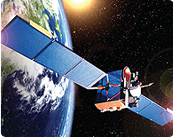 |
 |
 |
 |
| Satellite Broadcasting | Enterprise Networking | Disaster Recovery | Satellite Capacity |
| Satellite Broadcasting provides End-to-end Broadcast solutions from Content Playout Services, Occassional Cast to Remote Content Management at regional or global scales. Read More Info |
Enterprise Networking empowers businesses and Internet Service Providers (ISP) to deliver data, multimedia content and VoIP applications over satellite to link up your global offices. Read More Info |
Disaster Recovery services automatically restore vital communications between your critical locations though a dedicated 24 x 7 Satellite Overlay network. Regardless of your industry, we design contingency plans to ensure your business continuity. Read More Info |
Satellite Capacity on board SingTel’s own and leased satellite transponders supports a wide variety of applications including broadcast and communications, ranging from a few kbps to full transponder lease. Read More Info |
| For any query or to contact us please click here | |||






 Channel IPTV Whitepaper!
Channel IPTV Whitepaper!